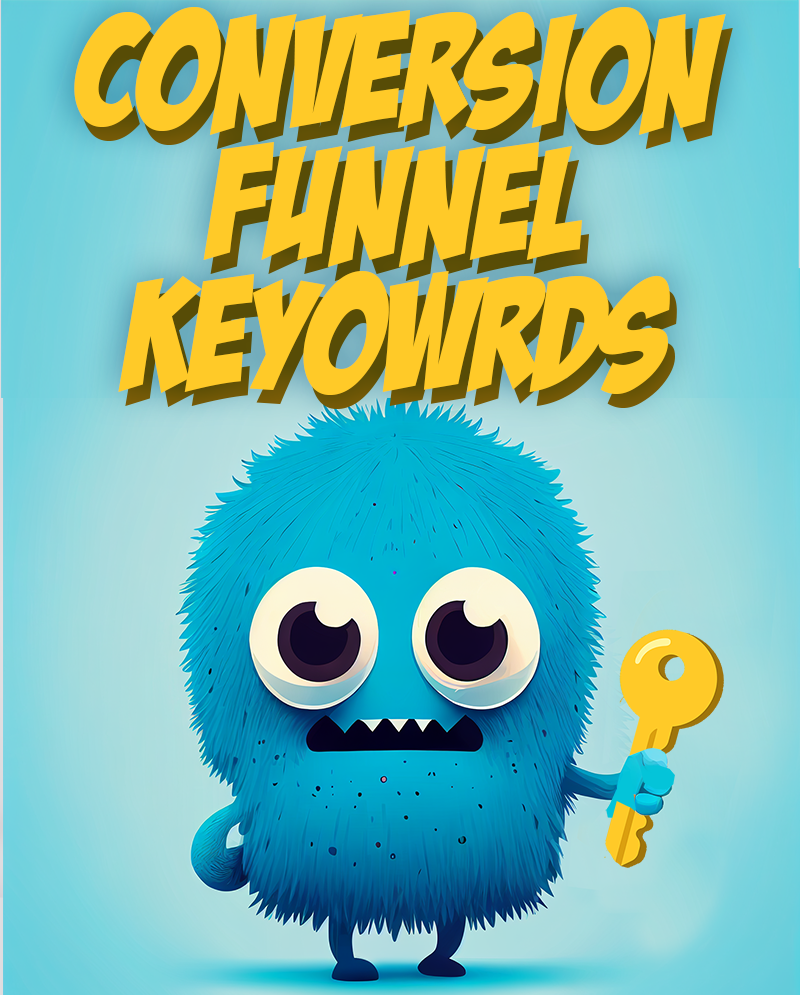
Conversion Funnel Keywords
Using different keywords at different stages in the conversion funnel is crucial for effective conversion optimization. The conversion funnel represents the journey that a potential customer takes from the initial awareness of a product or service to making a purchase decision. It typically consists of stages such as awareness, interest, desire and action. Here’s why using different keywords at each stage is important:
- Awareness Stage:
- Objective: At this stage, the goal is to generate awareness and attract a broad audience.
- Keyword Focus: Use broad and general keywords that are related to your industry or product category. Focus on keywords that potential customers might use during the early stages of their research.
- Example: If you sell running shoes, use keywords like “running shoes,” “athletic footwear,” or “best shoes for running.”
- Interest Stage:
- Objective: The user is considering various options and exploring specific features or benefits.
- Keyword Focus: Use more specific and detailed keywords that highlight product features, benefits, or use cases. Long-tail keywords can be effective here.
- Example: For running shoes, use keywords like “lightweight running shoes,” “stability running shoes,” or “best shoes for long-distance running.”
- Desire Stage:
- Objective: The user is ready to make a purchase decision and is likely comparing brands or looking for the best deal.
- Keyword Focus: Target transactional keywords that indicate a readiness to buy, such as brand names, model numbers, or terms like “buy,” “discount,” or “deal.”
- Example: Use keywords like “Nike Air Zoom Pegasus sale,” “Asics Gel-Kayano reviews,” or “Adidas Ultraboost best price.”
- Action Stage:
- Objective: The user is ready to take a specific action, such as making a purchase, signing up for a trial, or contacting your business.
- Keyword Focus: Target keywords that directly indicate a desire to take action. This may include terms like “buy now,” “free trial,” “sign up,” or “request a quote.”
- Example: Use keywords like “order running shoes online,” “free trial for fitness app,” or “get a quote for web design services.”

By aligning your keyword strategy with the different stages of the conversion funnel, you can:
Reach the Right Audience: Targeting specific keywords helps ensure your content reaches users at the stage where they are in the conversion process.
Improve Relevance: Using keywords that match the user’s intent at each stage makes your content more relevant, increasing the likelihood of engagement.
Optimize Ad Spend: Tailoring your keywords can help optimize your advertising budget by focusing on the most effective keywords for each stage.
Enhance User Experience: Providing the right information at the right stage of the funnel contributes to a positive user experience, building trust and increasing the likelihood of conversion.
Keywords
Awareness Keywords:
- Informational terms
- Problem-oriented queries
- Educational content
- How-to phrases
- Introduction to [product/service]
- [Industry] trends
- Benefits of [product/service]
- [Problem] solutions
Example: “How to improve website speed,” “Benefits of using CRM software,” “Introduction to sustainable living.”
Interest Keywords:
- Product or service category terms
- Comparison keywords
- Reviews of [product/service]
- Best [product/service] for [specific use]
- [Brand] vs [Competitor]
- Features of [product/service]
- [Industry] case studies
Example: “Best budget smartphones 2023,” “Comparison of fitness trackers,” “Reviews of XYZ brand laptops.”
Desire Keywords:
- Terms indicating intent to purchase
- [Product/service] discounts
- Testimonials for [product/service]
- [Product/service] for [target audience]
- [Brand] loyalty program
- Limited-time offers
- [Product] financing options
Example: “Buy [specific product] online,” “Discounts on [service] subscriptions,” “Testimonials for XYZ product.”
Action Keywords:
- Direct call-to-action phrases
- Purchase-related terms
- Sign up for [product/service]
- Free trial of [product/service]
- Order [product] online
- Get a quote for [service]
- [Brand] membership
Example: “Buy now,” “Sign up for free trial,” “Order [product] online,” “Get a quote for web design services.”
Remember, the effectiveness of keywords can vary depending on your industry, target audience, and specific business goals. Regularly analyze performance metrics to refine and optimize your keyword strategy.
